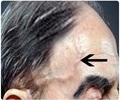Men with erectile dysfunction are more likely to have the beginning signs of atherosclerosis, or clogging and hardening of the arteries due to the buildup of plaque, than men without the disorder
Erectile dysfunction (ED) is the inability of a man to achieve or maintain an erection sufficient for his sexual needs or the needs of his partner. Most men experience this at some point in their lives, usually by age 40, and are not psychologically affected by it. Some men, however, experience chronic, complete ED (impotence), and often leads to diminished self-esteem.
According to a new study in the October 18 issue of the Journal of the American College of Cardiology, erectile dysfunction can represent an early clinical manifestation of a diffuse subclinical vascular disease and coronary artery disease is the most important problem that needs to be investigated. The smaller penile arteries suffer obstruction from plaque burden earlier than the larger coronary arteries hence ED may be symptomatic before a coronary event.The purpose of the study, conducted in the University of Modena and Reggio Emilia, Modena, Italy, was to assess the prevalence and extent of coronary artery atherosclerosis in asymptomatic patients with vascular ED.
The researchers studied 70 patients with vascular ED, and 73 control subjects with no history of coronary artery disease. They measured traditional coronary risk factors, circulating levels of C-reactive protein (CRP), endothelial function by ultrasound of brachial artery, and coronary artery calcification by multi-slice computed tomography. The patients and the control group were similar for age, race, and coronary risk score.
The men with ED had significantly higher levels of C-reactive protein (an emerging coronary risk factor), they were more likely to have abnormal blood vessel responses to changes in blood flow (as measured by flow mediated dilation), and more of them had coronary artery calcifications detected on coronary CT scans.
The results of this study indicate that coronary atherosclerosis was found to be more severe in patients with vascular ED; ED predicts the presence and extent of subclinical atherosclerosis independent of traditional risk factors for cardiovascular disease. Thus, ED may be considered an additional, early warning sign of coronary atherosclerosis.
Despite the limitations of the study, it is perceived that the findings indicate erectile dysfunction should be treated as a possible signal of the early stages of atherosclerosis.






